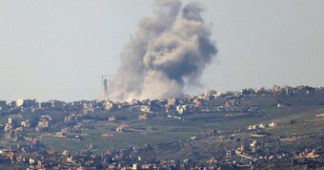If the Gaza war established entirely new rules of engagement throughout the region, do Israel’s western allies expect to escape unscathed in an expanded war? How do they think they could arm military aggression against a country and yet remain safely in its capital city?
Jun 28, 2024
Israel’s brutal, nine-month military assault on Gaza has full support from several western-allied states, not only in supplying the occupation army’s war machine with a broad range of armaments and ammunition but also through direct military participation. The United States and Britain, for example, have provided vital reconnaissance and intelligence data and have sent their special forces to assist Israel in military operations.
An 8 June New York Times report revealed that US forces assisted the Israelis in retrieving four Israeli captives from Gaza’s Nuseirat refugee camp, killing at least 274 Palestinian civilians and three additional captives and leaving over 698 wounded. According to the paper’s Israeli sources, the US and UK provided intelligence from the air and cyberspace that Israel could not obtain on its own.
On 29 May, the Declassified UK media project reported that London authorized an unprecedented 60 Israel-bound flights using cargo planes that took off from the UK’s RAF Akrotiri air base in Cyprus, a facility covertly used by the US Air Force to move weapons to Israel.
The British government has not revealed the content of the air cargo transported – and maintains that no “lethal aid” is included. London instead claims that RAF flights to the occupation state are used to support its “diplomatic engagement” with Tel Aviv and repatriate British subjects – an odd use of military aircraft when Israel’s Ben Gurion Airport is still operational for regular passenger travel.
London has vigorously invoked its D-Notice since just after the war’s onset, a military and security directive aimed at preventing media outlets from publishing information that could harm national security, specifically relating to British airborne Special Forces (SAS) operations in Gaza. No further information has been revealed since the directive was issued on 28 October 2023.
How western intel penetrates West Asia
But all those concealment efforts were cracked open during Israel’s disproportionate military operation to secure the release of captives during the recent Nuseirat camp fiasco. Trending videos appeared of an Israeli helicopter landing next to the recently-installed $320 million US’ aid pier’ and of ‘aid trucks’ carrying special ops teams that were flanked by armored vehicles during the operation.
Media then reported that dozens of US and UK drones assisted in the Nuseirat camp assault, ostensibly by providing reconnaissance services to the Israeli military.
These incidents highlight not only direct western military participation in the war on Gaza but also the brazen exploitation of diplomatic cover or humanitarian work to prepare and carry out military actions that have led to mass civilian casualties and war crimes, as described by many United Nations institutions.
The question now is whether western facilities and troops will come under target as the war expands, potentially to Lebanon, given the evident collusion of western states in Israel’s aggressions – especially those in flagrant violation of international norms and law.
Although the use of embassies and civilian institutions – in the modern sense – as bases for intelligence gathering and launching special missions is not a new practice and dates back to at least the nineteenth century, current developments in technology and computing have enabled these facilities to act as spying and eavesdropping centers, monitoring and storing information for an entire country.
What was previously impossible has become reality through wireless communication and the Internet. Signal intelligence formerly gained by planting eavesdropping and listening devices can now be accessed via the common smartphone – with data funneled to these centers inside sovereign states.
‘Second-biggest US Embassy in the world’
Spawling approximately 174 thousand square meters, around 13 kilometers from the Lebanese capital of Beirut, lies the second largest embassy in West Asia – and the world. The new US Embassy in Beirut is surpassed in size only by its counterpart in Baghdad’s “Green Zone.”
Subtracting from the massive size of the embassy and its cost of nearly a billion dollars, there are many questions about the need for such facilities and what they contain.
The computer-generated images published by the embassy show a complex featuring multi-story buildings with tall glass windows, entertainment areas, a swimming pool surrounded by greenery, and views of the Lebanese capital. According to the project website, the complex includes an office, representative housing for employees, community facilities, and associated support facilities.
In May 2023, the Intelligence Online website reported that the massive billion-dollar complex will include a data collection facility, preparing the site as the new regional headquarters for US intelligence. The report says that because of its proximity to Syria, “Lebanon is considered a safe and strategic location for the deployment of intelligence agents already in the region as well as new personnel, who are selected directly from Washington-based agencies.”
Although it is not possible to obtain precise information about the design of this embassy, the excavations below surface level, the use of reinforced concrete in the structure, and its fortified location on top of a hill suggest that there is more to its operations, especially since several precedents of the US Beirut diplomatic mission being implicated in the work of intelligence services exist.
The 1983 bombing of the American Embassy revealed a high CIA death toll, with eight killed, including the CIA’s chief West Asia analyst and Near East director, Robert Ames, station chief Kenneth Haass, James Lewis, and most of the CIA’s Beirut employees.
The embassy was not only used as a CIA hub but also as a key regional intelligence base due to Lebanon’s proximity to both the sea and two British NATO bases in southern Cyprus, Dhekelia and Akrotiri, from which reinforcements or helicopter transfers can arrive rapidly onto Lebanese soil. A recent example, in 2020, is Washington’s smuggling of its agent Amer al-Fakhouri from the US embassy using an Osprey helicopter.
British Watchtowers on Lebanon’s borders
On 3 May, Lebanon announced the visit of an official delegation and a senior British intelligence officer the previous month to discuss the construction of new UK-built watchtowers. These are in addition to the more than three dozen watchtowers built by Britain during the Syrian war along the sensitive border between Lebanon and Syria.
According to leaks reported by Lebanon’s Al-Akhbar newspaper, the British delegation had asked the Lebanese army “to approve a plan to establish watchtowers along the border with occupied Palestine, similar to those existing on the eastern and northern borders with Syria.”
Following the low-profile visit, Lebanese caretaker Prime Minister Najib Mikati disclosed: “Establishing the towers and taking measures along the border are Israel’s conditions for stopping the war with Lebanon.”
Last February, the Lebanese Foreign Ministry received an official Syrian protest note classifying the British watchtowers as a threat to Syrian national security on several levels. The main threat is the tower systems’ sensitive intelligence and espionage equipment, which “shines deep into Syrian territory and collects information about the Syrian interior.”
According to Al-Akhbar’s report, “the information output from this equipment reaches the hands of the British, and the Israeli enemy benefits from the output to target Syrian territory and carry out strikes deep inside Syria.” The Syrian memorandum also refers to “the presence of some British officers at the towers.”
Security cameras monitor the surrounding area at a border point on Lebanon’s border with Syria (Photo by the Lebanese Army Command, Orientation Directorate)
The 38 British watchtowers that claim to assist Lebanese authorities in “combating smuggling” raise many questions instead, among them the reasoning behind the erection of such a large number of these structures. Why, too, do the towers contain thermal monitoring, eavesdropping, signal intelligence, and communications equipment – especially in light of the close relationship between Tel Aviv and London and the periodic presence of British officers in these towers under the pretext of training the Lebanese army?
A commanding officer of the Lebanese Armed Forces (LAF), interviewed at length by The Cradle in August 2021, contradicts London’s public claims about the towers, saying: “The aim of the towers today is to monitor the movements of Hezbollah and the Syrians.”
Dutch special forces in Dahiyeh
In March, Hezbollah captured several Dutch military forces operating covertly in Dahiyeh, the southern suburb of Beirut, which hosts several offices of the Lebanese Resistance. The detainees, discovered with hundreds of thousands of dollars worth of military equipment on their persons and in the vehicles, claimed they were operating under cover of the Dutch Embassy in Lebanon and were found with hundreds of thousands of dollars worth of military equipment and advanced communications devices on their persons and in their vehicles.
During investigations, the Dutchmen claimed they had entered the southern suburb as part of a training exercise for evacuating Dutch citizens and diplomats in the event of a war. However, no Dutch nationals of the embassy resided in that area. It was also found that the servicemen had not communicated about their mission with the Lebanese Ministry of Foreign Affairs, the Lebanese security services, or their country’s embassy.
That same month, a Spanish citizen was arrested for filming inside the same southern suburb of Beirut, only to discover later that he had a diplomatic passport and that his phone contained advanced software that prevented access to its data.
These events and a myriad of other examples show that some western governments continuously use western diplomatic and civilian facilities to gather intelligence or conduct special missions training in sovereign Lebanon.
These actions constitute a clear violation of the Vienna Convention on International Relations and the Vienna Convention on Consular Relations, which prohibit embassy diplomats from carrying out espionage activities. These actions don’t only place civilian populations in danger but also the thousands of professional diplomats in the country, all diplomatic missions, and the civilian facilities used as cover for illicit operations. They also drag otherwise immune diplomatic facilities into the legal framework of “hostilities,” intentionally or accidentally.
This danger is reinforced by Israel’s repeated violations of diplomatic and international norms, which are either ignored or protected by western allied states. Israeli unprecedented military strikes against Iran’s consulate building in Damascus in April, for instance, did not receive the deserved condemnation from most western capitals, which helped it avoid the requisite UN Security Council censure.
Since the basic value of international norms is the precedent and event on which this law is built, the possibility increases that such western-supported attacks will backfire wildly and lead to the retaliatory targeting of western facilities and embassies – all in the context of new legal precedents and customs created that no longer prohibit strikes on suspect non-military facilities.
It is yet unknown to what extent western governments can expect to maintain their double standards in the application of international law and customs, especially if the Gaza war they are materially supporting expands to Lebanon or other West Asian regions.
The Resistance Axis, which has, in the past nine months, normalized military strikes on Israel, missile attacks on Israel-destined shipping vessels, and weekly strikes on US and UK naval fleets, are but one escalation away – as in, a declared war on Lebanon – to create a new set of target banks that surpass their last ones.
Does that then include the US embassy in Baghdad, the largest in the region – and the world – hosting 10 thousand American employees and troops, or, closer to home, the second largest embassy in West Asia, the US embassy in Beirut?
It is difficult to imagine that such facilities will remain immune if western involvement remains apparent, which we already know to be a constant, daily flow of armaments to fuel Israel’s war machinery and provide Tel Aviv with military intelligence and target banks.
It will be even harder to protect diplomatic missions if they reveal themselves to essentially act as military command centers or intelligence hubs during the conduct of war. Targeting these facilities – which are already in breach of the Vienna Convention – can easily fall within the framework of self-defense and reciprocity as long as western states and Israel continue to normalize these illicit activities.
If the Gaza war established entirely new rules of engagement throughout the region, do Israel’s western allies expect to escape unscathed in an expanded war? How do they think they can arm military aggression against a country and yet remain safely in its capital city?
We remind our readers that publication of articles on our site does not mean that we agree with what is written. Our policy is to publish anything which we consider of interest, so as to assist our readers in forming their opinions. Sometimes we even publish articles with which we totally disagree, since we believe it is important for our readers to be informed on as wide a spectrum of views as possible.











